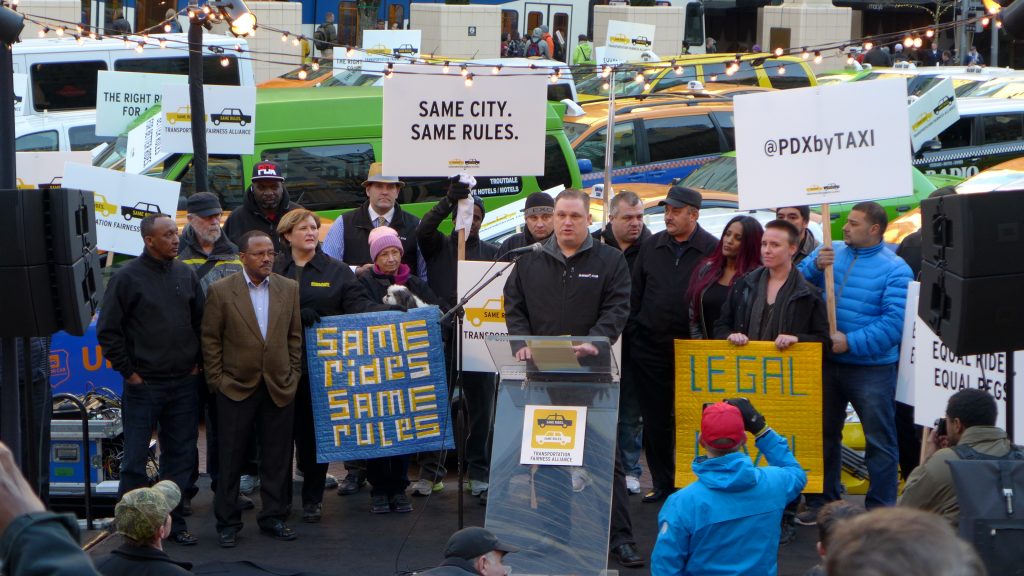
What if Uber was owned and run by its drivers?
Imagine companies like Uber and AirBnb as a Death Star. In Star Wars, the Death Star was a technological terror, a moon-shaped weapon with the ability to destroy the entire planet.
Harsh, but maybe true. Uber’s bet everything on taking over. They’ve raised over $8 billion from investors, are on track to make over $10 billion this year, and have an estimated 200,000 drivers, destroying the taxi industry in over 300 cities worldwide. They’ve done all this in just over five years.
In fact, they reached a $51 billion valuation faster than Facebook, and plan to raise even more money. If they’re successful, they’ll become the most valuable startup in history.
It’s a whole new era in tech entrepreneurship. The leaders of companies like Uber and AirBnb , are open about their desire for domination and their global ambition.
Platform co-operatives could be the alternative to Death Stars. Platform coops combine a cooperative business structure with an online platform to deliver a service. What if Uber was owned and governed by its drivers? What if Airbnb was owned and governed by its hosts? That’s what an emerging movement is exploring for the entire sharing economy.
How did Uber take over?
Platforms like Uber are so powerful because they’re exploiting today’s growing economic and political insecurity. Their business model relies on precarious workers. They hide behind the ideas of technological progress, the concept of a free market, and even common good, and get away with breaking laws over the way they run, their employment structure. Weak city governments either drink the Kool-Aid or struggle to contain them.
Their users are largely millennials. They offer a low-price service, a slick app experience, and even easy, work opportunities. That appeals to a generation that’s the lowest paid, with the highest debt, of any generation since the 1920s.
It won’t be long before everything that can be run by a tech platform, will be run by a tech platform. A survey by IBM recently showed that the thing top executives are most afraid of is the ‘uberization’ of everything. Uber’s decimated the taxi industry in San Francisco, without employing a single driver or owning a single car. There’s nothing to stop other businesses replicating that model in any industry, anywhere in the world.
In fact, it’s not that hard to build the technology to do it. Uber mostly uses old technology (lots of which was developed decades ago by taxpayer-funded government investment programs), and just puts it together in a new way. That $8 billion it raised from investors – most of that’s gone into marketing, and yes, world domination.
They’ve got political influence: AirBnB is currently running an $8.3 million campaign to stop restrictions that might limit AirBnB’s impact on housing costs in San Francisco.
And all that friction just helps them out. The more money Death Star platforms raise, the more press and customers they get. The more they break the rules, the more press and customers they get, which enables them to raise even more money. Taxi drivers strike? Jackpot!
If you’re outraged by the power of tech giants now, just wait until tech dominates the majority of services you depend on to live. If you’re worried about how tech companies use your personal information now, just wait until they can track you 24/7 online and off.
Bottom line: what seems like a bad situation for the 99% today could become much, much worse tomorrow.
Platform cooperatives: you're our only hope
In February 2017, activists, entrepreneurs, lawyers, union officials, financiers, and academics went to a conference in NYC to try and work out how the co-operative movement could disrupt the ‘Death Stars’. Conference organizers hoped to inspire a movement of provider-owned sharing economy platforms.
The main idea behind ‘platform cooperativism’ is that those who create the most value for the platforms— providers like drivers and hosts—should own and control the platforms. Current arrangements tend toward exploitation of those providers because they’re the ones taking on all the cost, and the risk of providing the service companies like Uber promote.
There are new examples of platform cooperatives, but at the moment they’re just brave experiments. There’s Loconomics, the cooperative version of task marketplace TaskRabbit. One of the most successful experiments is Enspiral Network, a New Zealand-based coworking community plus digital collective that allows hundreds of freelancers and social enterprises to work together for mutual benefit. Lazooz is the blockchain version of Uber where drivers mine digital currency by giving rides, while Swarm is the blockchain version of Kickstarter.
There’s a lot of work to be done: just like the Death Star companies have done, these new platform co-operatives need to work out how to establish funding systems, support networks, and how to offer good service at a low-price.
They need to be fully ‘cooperative’. Take, for example, Air bnb: a ‘platform cooperative’ version would need to be made up a series of local networks, which then cooperate and share customers and information.
And then they need support. There’s a huge amount of negative sentiment around the Death Stars, and platform co-operatives need to harness it. It needs to move away from its natural support network (ie Liberal America) and appeal to everyone.
The odds against this more beautiful world are the same odds Luke Skywalker faced against the Death Star in the original Star Wars. The key to victory is the same too. We must use the force, but the force in this case isn’t some mystical energy, the force is us.
This piece was originally published on Evonomics.com. its writer is Neal Gorenflo – he’s the co-founder of the nonprofit solutions journalism outlet called Shareable which reports on platform co-operatives and other wealth spreading innovations from around the world. Check out the new book he co-edited, “Sharing Cities: Activating the Urban Commons.”



